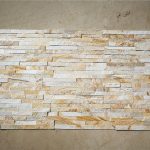Unveiling the Beauty of Cultured Bluestone A Comprehensive Guide

Introduction
Bluestone is a popular choice for outdoor spaces, known for its natural beauty and durability. In recent years, a new innovation has emerged in the market - cultured bluestone. This engineered material offers all the aesthetic appeal of traditional bluestone, with added benefits such as increased durability and versatility. In this comprehensive guide, we will explore the world of cultured bluestone, its properties, uses, benefits, and how it compares to natural bluestone.
1. What is Cultured Bluestone?
Cultured bluestone is a man-made material designed to replicate the look and feel of natural bluestone. important site is composed of a mixture of natural stone aggregates, cement, and other additives that are molded and cured to create a durable and versatile product. The manufacturing process allows for greater control over the color, texture, and size of the stones, resulting in a more uniform and consistent appearance compared to natural bluestone.
2. Properties of Cultured Bluestone
Cultured bluestone offers a range of properties that make it a popular choice for various applications. Some key properties of cultured bluestone include:
- Durability: Cultured bluestone is engineered to be highly durable and resistant to wear and tear, making it ideal for outdoor use in harsh weather conditions.
- Versatility: Cultured bluestone comes in a variety of shapes, sizes, and colors, allowing for endless design possibilities for patios, walkways, and other outdoor spaces.
- Slip Resistance: The textured surface of cultured bluestone provides excellent slip resistance, making it a safe choice for outdoor areas prone to moisture.
- Low Maintenance: Cultured bluestone requires minimal maintenance compared to natural stone, as it is less prone to staining and fading over time.
3. Uses of Cultured Bluestone
Cultured bluestone can be used in a wide range of applications both indoors and outdoors. Some common uses of cultured bluestone include:
- Patios: Cultured bluestone is a popular choice for patio flooring due to its durability and aesthetic appeal. It can create a cohesive and stylish outdoor living space.
- Walkways: Cultured bluestone can be used to create elegant and functional walkways that blend seamlessly with the surrounding landscape.
- Pool Decks: The slip-resistant properties of cultured bluestone make it an ideal choice for pool decks, providing a safe and stylish surface for lounging and entertaining.
- Driveways: Cultured bluestone can be used to create stunning driveways that enhance the curb appeal of a property and withstand heavy traffic.
4. Benefits of Cultured Bluestone
There are several benefits to choosing cultured bluestone over natural bluestone or other materials for your outdoor projects. Some key benefits include:
- Cost-Effective: Cultured bluestone is typically more affordable than natural bluestone, making it a budget-friendly option for homeowners and contractors.
- Consistency: Cultured bluestone offers a consistent color and texture throughout, eliminating the need to sort through natural stones to find a matching set.

- Easy Installation: Cultured bluestone is uniform in size and shape, making it easier and faster to install compared to natural stone, which can vary in thickness and shape.
- Customization: Cultured bluestone can be manufactured in a wide range of colors and finishes to suit any design aesthetic, allowing for greater customization options.
5. Cultured Bluestone vs. Natural Bluestone
While both cultured bluestone and natural bluestone offer their own set of benefits, there are some key differences between the two materials that may influence your decision. Here are some factors to consider when choosing between cultured and natural bluestone:
- Appearance: Natural bluestone has a unique and varied appearance with natural color variations and textures, while cultured bluestone offers a more uniform and consistent look.
- Durability: Cultured bluestone is engineered to be more durable and resistant to wear and tear compared to natural bluestone, which may be more prone to cracking and chipping.
- Maintenance: Cultured bluestone requires less maintenance than natural bluestone, as it is less porous and more resistant to staining and fading over time.
- Cost: Cultured bluestone is generally more cost-effective than natural bluestone, making it a more budget-friendly option for larger projects.
6. Installation and Maintenance of Cultured Bluestone
Installing cultured bluestone requires careful planning and attention to detail to ensure a successful outcome. Here are some key tips for installing and maintaining cultured bluestone:
- Preparation: Proper site preparation is essential for a successful installation. Ensure the base is well compacted and level before laying the cultured bluestone.
- Installation: Follow the manufacturer's recommendations for installation, including using the correct adhesive and grout materials to ensure a secure and long-lasting bond.
- Sealing: Consider sealing cultured bluestone to enhance its durability and protect it from staining and fading over time. Follow the manufacturer's instructions for the appropriate sealer to use.
- Maintenance: Regular cleaning and maintenance are key to preserving the appearance and longevity of cultured bluestone. Sweep or rinse the surface regularly to remove dirt and debris, and address any stains promptly using a mild detergent and water.
7. Environmental Considerations
As a manufactured material, cultured bluestone has both environmental benefits and considerations to take into account. While the production of cultured bluestone can result in lower carbon emissions compared to natural stone quarrying, it is still important to choose a manufacturer that follows sustainable practices and uses eco-friendly materials in the production process. Additionally, proper disposal of any waste materials generated during installation is essential to minimize environmental impact.
8. Conclusion
Cultured bluestone offers a durable, versatile, and cost-effective alternative to natural bluestone for a wide range of outdoor applications. With its consistent appearance, slip resistance, and low maintenance requirements, cultured bluestone is an excellent choice for creating beautiful and functional outdoor spaces. Whether you are designing a patio, walkway, pool deck, or driveway, cultured bluestone provides endless design possibilities to enhance the beauty and value of your property. Consider the unique properties and benefits of cultured bluestone when planning your next outdoor project to enjoy a stylish and long-lasting surface that will stand the test of time.
